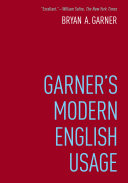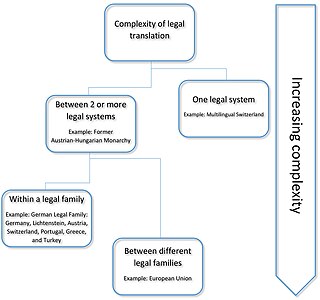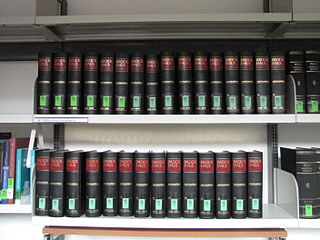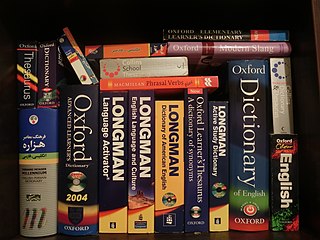Different types
According to Nielsen 1994, LSP dictionaries may cover one language (monolingual LSP dictionaries) or two languages (bilingual LSP dictionaries), and occasionally more languages. An LSP dictionary that attempts to cover as much of the vocabulary in a subject field as possible is called a maximizing dictionary, and an LSP dictionary that attempts to cover a limited number of terms within a subject field is called a minimizing dictionary.
Also, Nielsen 1994 distinguishes between the following types of dictionaries: An LSP dictionary that covers more than one subject field is called a multi-field dictionary, an LSP dictionary that covers one subject field (e.g. a dictionary of law) is called a single-field dictionary, and an LSP dictionary that covers part of a subject field (e.g. a dictionary of contract law) is called a sub-field dictionary.
A multi-field dictionary is a specialized dictionary that has been designed and compiled to cover the terms within two or more subject fields. Multi-field dictionaries should be contrasted with single-field dictionaries and sub-field dictionaries.
A single-field dictionary is a specialized dictionary that has been designed and compiled to cover the terms of one particular subject field. Single-field dictionaries should be contrasted with multi-field dictionaries and sub-field dictionaries.
A sub-field dictionary is a specialized dictionary that has been designed and compiled to cover the terms of one sub-fields of a particular subject field. It is therefore a sub-division of the class of dictionary called a single-field dictionary. Sub-field dictionaries should be contrasted with multi-field dictionaries and single-field dictionaries.
A common form of LSP dictionary is a usage dictionary for a particular field or genre, such as journalism, providing advice on words and phrases to prefer or prefer, and distinctions between easily confused usages. Probably the best known of these for new style writing is the AP Stylebook . Many such works also have elements of a style guide, though most of the latter are not in dictionary format, but arranged as a series of rules in sections, and more concerned with grammar and punctuation. Some usage dictionaries are intended for a general rather than specialized audience, and are therefore more comprehensive; two major ones are Fowler's Dictionary of Modern English Usage and Garner's Modern English Usage .

The Associated Press Stylebook and Briefing on Media Law, usually called the AP Stylebook, is an English grammar style and usage guide created by American journalists working for or connected with the Associated Press over the last century to standardize mass communications. Although it is sold as a guide for reporters, it has become the leading reference for most forms of public-facing corporate communication over the last half-century. The Stylebook offers a basic reference to grammar, punctuation and principles of reporting, including many definitions and rules for usage as well as styles for capitalization, abbreviation, spelling and numerals.

A style guide or manual of style is a set of standards for the writing, formatting and design of documents. It is often called a style sheet, although that term may have other meanings. These standards can be applied either for general use, or be required usage for an individual publication, a particular organization, or a specific field.

Garner's Modern English Usage (GMEU), written by Bryan A. Garner and published by Oxford University Press, is a usage dictionary and style guide for contemporary Modern English. It was first published in 1998 as A Dictionary of Modern American Usage, with a focus on American English, which it retained for the next two editions as Garner's Modern American Usage (GMAU). It was expanded to cover English more broadly in the 2016 fourth edition, under the present title. The work covers issues of usage, pronunciation, and style, from distinctions among commonly confused words and phrases and notes on how to prevent verbosity and obscurity. In addition, it contains essays about the English language. An abridged version of the first edition was also published as The Oxford Dictionary of American Usage and Style in 2000.
This page is based on this
Wikipedia article Text is available under the
CC BY-SA 4.0 license; additional terms may apply.
Images, videos and audio are available under their respective licenses.
Lexicography is divided into two separate but equally important groups:
A Monolingual learner's dictionary is a type of dictionary designed to meet the reference needs of people learning a foreign language. MLDs are based on the premise that language-learners should progress from a bilingual dictionary to a monolingual one as they become more proficient in their target language, but that general-purpose dictionaries are inappropriate for their needs. Dictionaries for learners include information on grammar, usage, common errors, collocation, and pragmatics, which is largely missing from standard dictionaries, because native speakers tend to know these aspects of language intuitively. And while the definitions in standard dictionaries are often written in difficult language, those in a monolingual learner’s dictionary aim to be simple and accessible.
Terminology is the study of terms and their use. Terms are words and compound words or multi-word expressions that in specific contexts are given specific meanings—these may deviate from the meanings the same words have in other contexts and in everyday language. Terminology is a discipline that studies, among other things, the development of such terms and their interrelationships within a specialized domain. Terminology differs from lexicography, as it involves the study of concepts, conceptual systems and their labels (terms), whereas lexicography studies words and their meanings.
Legal lexicography is the complex of activities concerned with the development of theories and principles for the design, compilation, use, and evaluation of dictionaries within the field of law, see e.g. Nielsen 1994.
A specialized dictionary is a dictionary that covers a relatively restricted set of phenomena. The definitive book on the subject includes chapters on dictionaries of:

A law dictionary is a dictionary that is designed and compiled to give information about terms used in the field of law.

Legal translation is the translation of texts within the field of law. As law is a culture-dependent subject field, legal translation is not necessarily linguistically transparent. Intransparency in translation can be avoided somewhat by use of Latin legal terminology, where possible.
Lexicographic information cost is a concept within the field of lexicography. The term refers to the difficulties and inconveniences that the user of a dictionary believes or feels are associated with consulting a particular dictionary or dictionary article. For example, the extensive use of abbreviations in articles in order to save space may annoy the user, because it is often difficult to read such condensed texts and understand the abbreviations, thereby increasing the lexicographic information costs.
Specialized lexicography is an academic discipline that is concerned with development of theories and principles for the design, compilation, use and evaluation of specialized dictionaries. A specialized dictionary is a dictionary that covers a relatively restricted set of phenomena, usually within one or more subject fields. An alternative term for this type of dictionary is LSP dictionary.
Centre for Lexicography is a research centre affiliated with the Aarhus School of Business, University of Aarhus Denmark, and was established in 1996. The Centre's aim is to carry out lexicographic research into needs-adapted information and data access, i.e. research work into dictionary theory in general and it has built a solid, international reputation in that field.

An electronic dictionary is a dictionary whose data exists in digital form and can be accessed through a number of different media. Electronic dictionaries can be found in several forms, including software installed on tablet or desktop computers, mobile apps, web applications, and as a built-in function of E-readers. They may be free or require payment.

A bilingual dictionary or translation dictionary is a specialized dictionary used to translate words or phrases from one language to another. Bilingual dictionaries can be unidirectional, meaning that they list the meanings of words of one language in another, or can be bidirectional, allowing translation to and from both languages. Bidirectional bilingual dictionaries usually consist of two sections, each listing words and phrases of one language alphabetically along with their translation. In addition to the translation, a bilingual dictionary usually indicates the part of speech, gender, verb type, declension model and other grammatical clues to help a non-native speaker use the word. Other features sometimes present in bilingual dictionaries are lists of phrases, usage and style guides, verb tables, maps and grammar references. In contrast to the bilingual dictionary, a monolingual dictionary defines words and phrases instead of translating them.
A foreign language writing aid is a computer program or any other instrument that assists a non-native language user in writing decently in their target language. Assistive operations can be classified into two categories: on-the-fly prompts and post-writing checks. Assisted aspects of writing include: lexical, syntactic, lexical semantic and idiomatic expression transfer, etc. Different types of foreign language writing aids include automated proofreading applications, text corpora, dictionaries, translation aids and orthography aids.
Language for specific purposes (LSP) has been primarily used to refer to two areas within applied linguistics:
- One focusing on the needs in education and training
- One with a focus on research on language variation across a particular subject field








